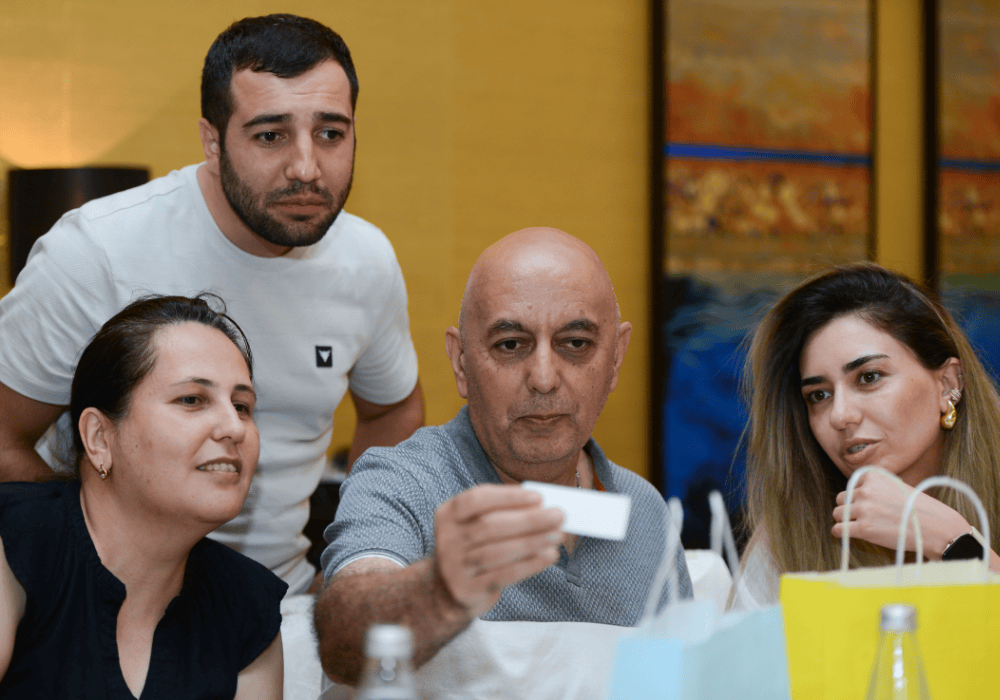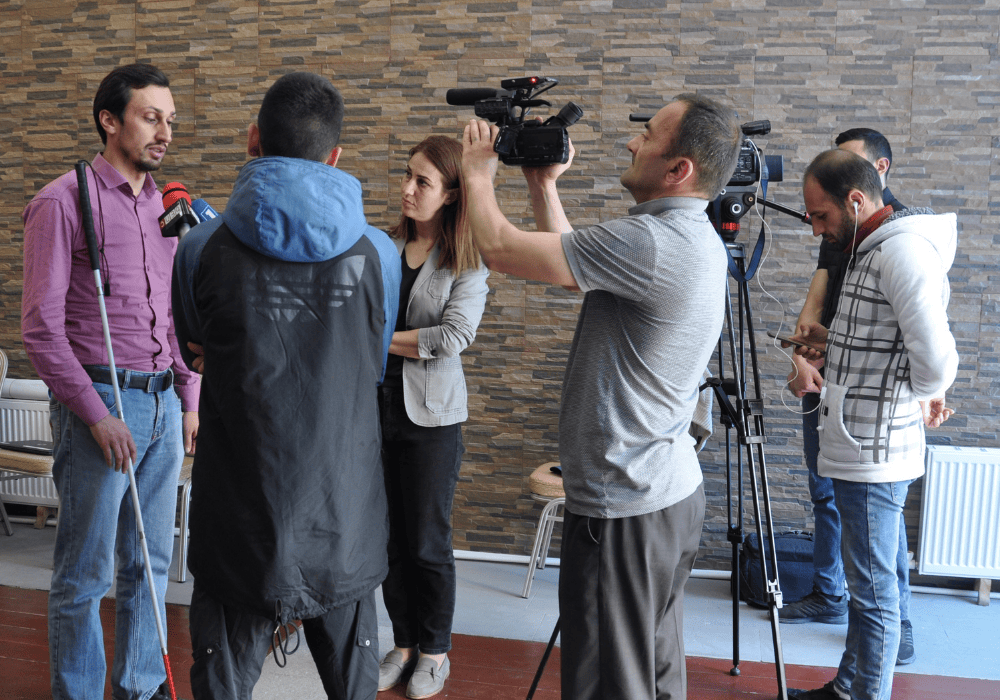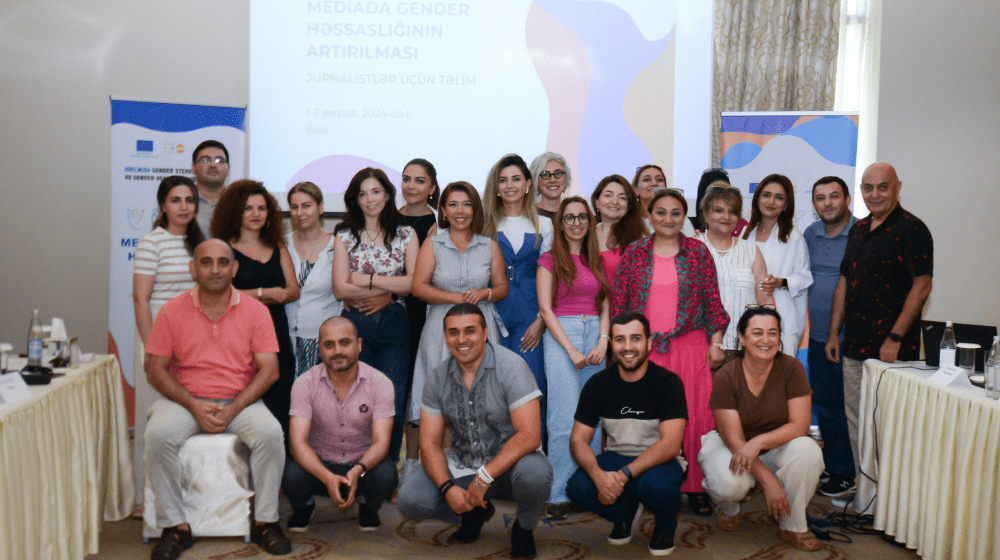How media makes a difference
Media plays a pivotal role in shaping public attitudes and perceptions about gender roles. Its influence extends to reflecting, reinforcing and spreading societal patterns, norms and stereotypes. According to the World Economic Forum, 96 per cent of the global population reads, watches or listens to news and entertainment, spending more than 23 hours viewing media content during a typical week.
At the end of the “EU 4 Gender Equality: Together against gender stereotypes and gender-based violence” project’s first phase, funded by the European Union and implemented jointly by UN Women and UNFPA, an assessment was conducted to measure progress in overcoming harmful gender norms and stereotypes and in developing gender-transformative behavioural change in the EU’s Eastern Partnership countries. The assessment underscored the media's crucial role in promoting gender equality and combating violence. Focus group discussions with local advocates and civil society organizations in Armenia, Azerbaijan, Belarus, Georgia, Moldova and Ukraine emphasized that addressing gender issues requires more than just awareness; it demands a concerted effort to educate media professionals on how to represent gender issues sensitively and accurately.
Empowering journalists across the region
In response to these needs, the “EU 4 Gender Equality” programme has launched a series of educational events aimed at journalists and media professionals in the region.
A training session for media professionals held in Azerbaijan brought together 24 journalists, two bloggers, and 12 editors and editors-in-chief.

“Attending these workshops has profoundly changed my perspective. I now have a keen eye for identifying and addressing biases in articles. While I don’t believe journalists intentionally propagate bias, many do so unknowingly, which can inadvertently violate women’s rights and promote skewed views,” said Fakhriyya Abdullayeva, an editor at the news website Afn.az. “By sharing our knowledge on gender-sensitive reporting with colleagues, we are helping to reduce gender stereotypes and improve the quality of media coverage,” she added.
It is important for media professionals not only to understand gender issues but also to know how to report on marginalized groups and violence. Every detail matters — from using inclusive language to accurately representing the experiences of different people. To address these needs, the “EU 4 Gender Equality” programme, in collaboration with the NGO Agate Rights Defense Center for Women with Disabilities, trained 124 journalists and social media influencers in Armenia in 2021 and 2022 on how to report sensitively on gender and disability issues and counter discrimination against women with disabilities. This training provided knowledge on how to ensure that media coverage is empathetic, respectful and promotes a fair and inclusive portrayal of everyone.
“Women and girls with disabilities need to be fully represented in society. Working with the media for this purpose is important to break the systematic marginalization and attitudinal barriers that women and girls face,” said Gayane Grigoryan from the Agate Rights Defense Center for Women with Disabilities NGO.

Social media influencers as champions of gender equality
Beyond traditional media, social media influencers and bloggers significantly shape perceptions of gender equality. According to Datareportal, social media use continues to grow, with the total number of active social media users reaching more than five billion in July 2024 — that is equivalent to 63.7 per cent of the global population. Statistics also indicate that 94.9 per cent of internet users engage with social media every month. Recognizing this vast influence, the “EU 4 Gender Equality” programme actively engages both journalists and social media content creators to promote gender-sensitive narratives and challenge harmful stereotypes.
“It is clear that influencers and bloggers need more education on gender equality to ensure their posts follow responsible guidelines,” said Saleh Nasirov, a blogger from Azerbaijan, after the “EU 4 Gender Equality” training.
As a part of extended efforts to combat gender stereotypes beyond traditional media, in 2021 “EU 4 Gender Equality” launched the No More Gringe campaign, capturing widespread attention across platforms such as TikTok, Instagram, YouTube and Facebook. This campaign reached nearly six million young people in Ukraine and utilized the influence of 15 prominent TikTok influencers who had been trained by the programme to tackle gender stereotypes.
In Moldova, the programme engaged social media influencers and their partners to reflect on the harmful gender stereotypes that contribute to gender-based violence. In their videos, influencers initiated conversations about gender roles, challenging the traditional traits and characteristics assigned to men and women. They highlighted common stereotypes and emphasized that change is possible — showing that life can be lived beyond these limiting beliefs.
Continuing the momentum for change
As the “EU 4 Gender Equality” programme moves forward, its commitment to promoting gender-sensitive reporting and empowering media professionals remains strong. By leveraging the reach of these voices, the programme aims to spark broader conversations about gender equality.
The article is produced in the framework of the ‘EU 4 Gender Equality: Together against gender stereotypes and gender-based violence’ programme, funded by the European Union, implemented jointly by UN Women and UNFPA.
This article was produced with the financial support of the European Union. Its contents are the sole responsibility of UN Women and UNFPA and do not necessarily reflect the views of the European Union.


